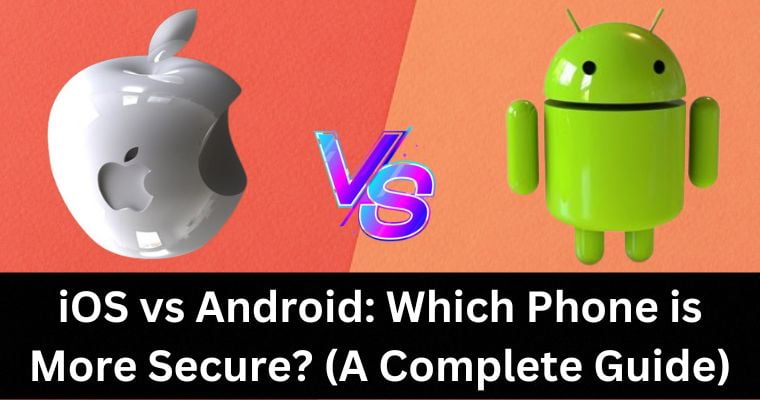Selecting a mobile operating system is a crucial decision, and the two major players in the market are iOS & Android. Both platforms have different features and capabilities, but security is a foremost concern for users.
With mobile devices storing a huge amount of secret data, including personal and financial information, it is very important to choose a secure platform.
Table of Contents
A Brief Overview of iOS and Android Operating Systems
When it comes to mobile operating systems, Android & iOS are the most popular ones. Both have their own set of benefits and losses when it comes to safety.
Android is famous for its customization options and open-source nature, while iOS is well-known for its closed system and carefully curated environment.
In this piece of writing, we will closely examine the security features of both platforms to help you determine which one is safer. So, let’s dive in and explore the ongoing debate of Android vs. iOS – which one offers better security?
When it comes to safety, which is more trustworthy: Android or iOS? According to research, Android is more vulnerable to mobile malware attacks compared to iOS.
So, taking into account all the factors presented in this piece, it can be concluded that iOS is a more protected option.
Although improvements are required, iOS remains the top choice for Smartphone safety in 2025. However, it is significant to see these changes implemented in reality before fully committing to this belief.
Nonetheless, there is constantly room for further advancements to enhance the security of the operating system.
Apple has been keenly working to improve its safety measures in the face of competition from Google.
This effort has been demonstrated through different updates to its iOS operating system, such as the addition of features like recording indicators, the option for an approximate location, and enhanced password & tracker monitoring in Safari.
One mainly noteworthy improvement has been the ability to limit app tracking & data collection, which is a welcome addition for users concerned about privacy.
Overview of Android and iOS Security
The major objective of Android and iOS is to protect user data and devices, although the two platforms have different safety models. Android is an open-source platform, meaning that its code is openly available and can be edited by anybody.
While this offers developers flexibility and customization, it also leaves the platform open to safety threats. Malicious code can simply be incorporated into the system, which can compromise the safety of the device.
To reduce the dangers associated with using Android, Google has introduced several security measures.
The Android platform comes equipped with various security features such as Google Play Protect, which is designed to detect and eliminate malware and other security threats present in apps.
Additionally, Google has set up a bug bounty initiative that rewards researchers who uncover and report security weaknesses in the Android operating system.
When it comes to technological aspects, both iOS and Android have individual safety measures that make them logically secure.
Nevertheless, their security approaches are distinct. iOS is recognized for its “walled garden” strategy, where Apple has strict regulations over the activities that apps can or cannot perform on the device.
While it limits the threat of malware and other unsafe software being installed on the device, this approach also restricts the level of customization for both users and developers.
In comparison, Android provides a more open-source platform that allows for better flexibility in customization, but this also increases the likelihood of possible vulnerabilities and safety risks.
The significance of user behavior in phone security cannot be overstated. Even the most secure operating system can be compromised if the user is not vigilant in their online activities.
This includes using easily guessed passwords, clicking on untrustworthy links, or downloading apps from unreliable sources. It is crucial that users remain cautious and take necessary precautions to protect their personal information and prevent security breaches.
When it comes to protecting data privacy, iOS is extensively considered to be more trustworthy due to its implementation of advanced safety measures like end-to-end encryption & data minimization.
These measures make sure that user data is not shared with third parties and is only stored for as long as it is essential.
In contrast, Android has faced criticism for its data collection practices, with a number of users expressing concerns about their personal data being shared without their permission.
The app store is a significant aspect to take into account when comparing iOS and Android. While both platforms have their personal app stores, iOS’s App Store is famous for its strict regulations for app developers.
These strategies are in place to make sure that apps are secure and free from malware before they are made existing to users. In contrast, Google Play has had issues with allowing malicious apps to be published, resulting in notable safety breaches.
One of the main advantages iOS has over Android is that Apple releases regular security updates for its devices.
This means those vulnerabilities and other security issues are addressed and patched quickly, making users less likely to fall victim to security breaches. , so in some cases, updates may be slow or non-existent.
One major concern for Android users is their vulnerability to security threats, particularly if they are utilizing outdated devices.
The security of phone operating systems has long been a topic of debate, with iOS and Android both possessing their own advantages and limitations. Despite this, the ultimate question remains: which OS is the most secure?
The Ecosystems of iOS and Android
The security of a mobile platform can be influenced by various factors, and one of them is the ecosystem it operates in.
In this regard, iOS has an advantage due to its more uniform ecosystem, wherein the majority of users are using the latest version of the operating system.
A significant percentage of iPhone users update their devices within 51 days of a patch being issued, thanks to Apple’s control over its products’ hardware and software, which allows for faster and more efficient updates.
As a result, iOS devices receive security patches more promptly, reducing the likelihood of known vulnerabilities being exploited.
The Android ecosystem is more diverse and spread out, with a larger number of devices and versions of the operating system being used.
This can pose a challenge when it comes to quickly and effectively rolling out security updates, which can leave certain devices open to known vulnerabilities.
Furthermore, some manufacturers of these devices may not make security updates a top priority, leaving users with older devices more susceptible to attacks from malicious actors.
How Frequently Are Apple and Android Updated?
Updating software can bring about numerous advantages, such as fixing vulnerabilities and enhancing the user interface. A comparison of the update patterns in iOS and Android will be explored.
Android
Currently, Android follows an annual update schedule on the operating system level, as can be seen in the sequence of version releases from Pie (Android 9.0) in 2018 to the latest Android 12, with the codename Snow Cone.
This approach is driven, in part, by the fragmentation that exists within the Android community. Nevertheless, several smartphones offer support for updates, though it may not always be possible to upgrade to the latest Android version within a year of its release.
Despite the general perception that Android devices receive limited security updates, certain manufacturers such as Oppo, Samsung, Google Pixels, and OnePlus have made efforts to extend the support for security updates in their flagship devices.
Additionally, many other Android devices participate in the Android One program, which provides further security update support.
iOS
Unlike its Android counterpart, Apple concentrates on a limited number of device releases annually, thus enabling them to offer more frequent updates.
Apple has a longer lifespan for updates compared to Android, with the ability to update and run iOS 15 on older iPhones. The iOS update frequency is also more frequent, with Apple releasing up to five iOS updates between September 2021 and the time of writing.
This means that even early iPhones can continue to receive updates and operate effectively for longer periods of time.
The majority of these updates are focused on improving security and enhancing the user experience, which will ultimately contribute to the long-term reliability of iOS. Android, unfortunately, falls short in comparison to iOS in this regard.
Comparison between iOS and Android in terms of app security
The security of mobile applications is a critical factor to take into account when evaluating the security of iPhone and Android devices.
While both Apple’s App Store and Google’s Play Store have implemented steps to reduce the risk of harmful apps, the effectiveness of these measures is still debatable.
The sole provider of applications for iPhone users is the Apple Store unless the iPhone is jailbroken. Despite the apparent limitations, this is an essential aspect of Apple’s security measures.
Every app that is available on the App Store is thoroughly reviewed by a member of the Apple Review team before it is made available to users.
Despite this meticulous review process, some harmful applications have still managed to bypass the system and make their way onto the App Store.
In contrast, Android users have a greater advantage than iPhone users in terms of the number of accessible apps. The Google Play Store boasts a huge array of options and provides improved security measures through Google Play Protect.
This feature efficiently scans over 100 billion apps every day, ensuring that they are free from malware or harmful issues. Moreover, Android apps are also sandboxed, equally to iOS apps, which restricts their access to their own files & other apps.
It is comparatively simpler to install apps from non-Play Store sources on Android devices than on iPhones.
Despite Google’s efforts to ensure security, numerous harmful apps have been discovered on the Play Store that has affected millions of Android devices, as reported by researchers.
In general, it has been observed that both Apple’s App Store and Google’s Play Store have experienced instances of allowing malicious apps to be available for download.
However, it has been noted that Google’s Play Store has a higher frequency of such incidents compared to Apple’s App Store. Consequently, it can be inferred that iPhone users benefit from better app security measures provided by Apple than Android users do with Google.
Advanced Security Features
Both iOS & Android provide an extensive range of security features, including fingerprint and Face ID authentication. However, it appears that the two operating systems have different perspectives on security.
The Android operating system boasts several security features that set it separately from its competitors, such as iOS. These features include Find My Device, which is similar to iOS’s Find My, Google Play Protect, Lock Down mode, and the ability to disable USB debugging.
On the other hand, iOS has its own unique security feature called iCloud keychain, which allows users to securely manage their login credentials using Hide My Email.
Furthermore, Apple takes pride in the fact that users can store sensitive information such as passwords and credit card details on their iPhones without fear of compromise.
iOS 15 has a lot more built-in security features. However, each platform has a particular focus on security in this regard and we cannot ignore this.
Comparison Between iOS and Android in Terms of Third-party Security Applications
It is important to use reliable security apps such as antivirus, VPN, password manager, and ad blockers to protect your devices in the modern world.
There is a large user base for both iOS and Android operating systems, with over three billion Android users and one billion iPhone users, leading to competition among software developers to create apps for both platforms.
As the Play Store has a larger collection of apps compared to the App Store, Android users have a broader selection of third-party security applications at their disposal.
Nevertheless, both iPhone and Android users have access to a myriad of highly-rated third-party security apps.
Despite the limited built-in security measures on iPhones and Android phones, users have access to a plethora of third-party security apps.
It is crucial to only download these apps from the official app stores, namely the Google Play Store and Apple App Store, to guarantee their safety.
Consequently, users have a diverse selection of third-party security apps at their disposal, regardless of the operating system they use.
Comparison of Real-Life Vulnerabilities in iOS and Android
One way of assessing the security of a mobile platform is to check actual instances of security breaches. In the past few years, a significant number of news stories have focused on examples of Android vulnerabilities being exploited by cybercriminals.
These exploits can take several forms, such as malware or phishing attacks. On the other hand, iOS vulnerabilities tend to be more particular and utilized more often by those involved in mobile surveillance activities.
The Android ecosystem is more fragmented compared to the iOS ecosystem, which may explain the differences in real-world exploits.
This is because there are numerous variations of devices and operating systems in use, making it challenging to create an exploit that will work across all of them.
Conversely, iOS devices have a more consistent hardware and software profile, making it simpler to develop exploits that will function on a larger number of devices.
Final Verdict: Which Platform is Safer?
Deciding which platform, iOS or Android, is more secure is a complex task as both have their own set of vulnerabilities. Although Android has a higher number of vulnerabilities, they are relatively easier to exploit.
Conversely, iOS is more difficult to breach, but when its vulnerabilities are exploited, the impact can be more severe. The security of a mobile platform is not solely reliant on the technology it employs, but also on the actions of its users and the regularity of security updates.
When deciding which platform to use, personal preferences and requirements are key determinants Android’s flexibility offers more customization options, whereas iOS’s consistent security updates and targeted exploits provide greater protection.
To maintain a high level of security, users must remain vigilant, keep their software up-to-date, use strong passwords, and refrain from downloading apps or clicking on links from unknown sources.
Frequently Asked Questions
Which operating system is best, iOS or Android?
The answer to the question depends on what aspect you are considering. Android is better than iOS for customization, but iOS is more secure than Android despite Android’s efforts.
Can the iPhone be considered more secure than Android?
Apple and Google are both implementing strong privacy and security measures, but statistics show that Apple’s iOS is currently more secure, with 20% fewer critical vulnerabilities than Android.
Which operating system is more susceptible to hacking: iOS or Android?
Compared to iPhone, Android is more vulnerable to hacking due to its open ecosystem and compatibility with various hardware designs from different manufacturers.
Which operating system, Apple or Android, provides better privacy?
Apple has greater authority over its data and can safeguard it more effectively as it retains the encryption keys for its iCloud service on its own servers. In contrast, Google stores the keys on external servers.
Apple uses end-to-end encryption, which restricts access to sensitive data to only the user.
Can hackers breach the security of an iPhone?
This question has been a topic of debate and concern among technology experts and iPhone users alike. The iPhone is known for its strong security and privacy features, but no system is completely foolproof.
Therefore, it is essential to explore the potential vulnerabilities that may exist and the methods that hackers could use to exploit them.
By doing so, we can better understand the risks and take appropriate measures to protect our devices and personal information.
Can iPhones be infected with viruses?
Luckily for Apple fans, iPhone viruses are extremely rare but not unheard of. Although generally safe, iPhones can become vulnerable to viruses when jailbroken.
Jailbreaking an iPhone can be compared to unlocking it but with questionable legality.



